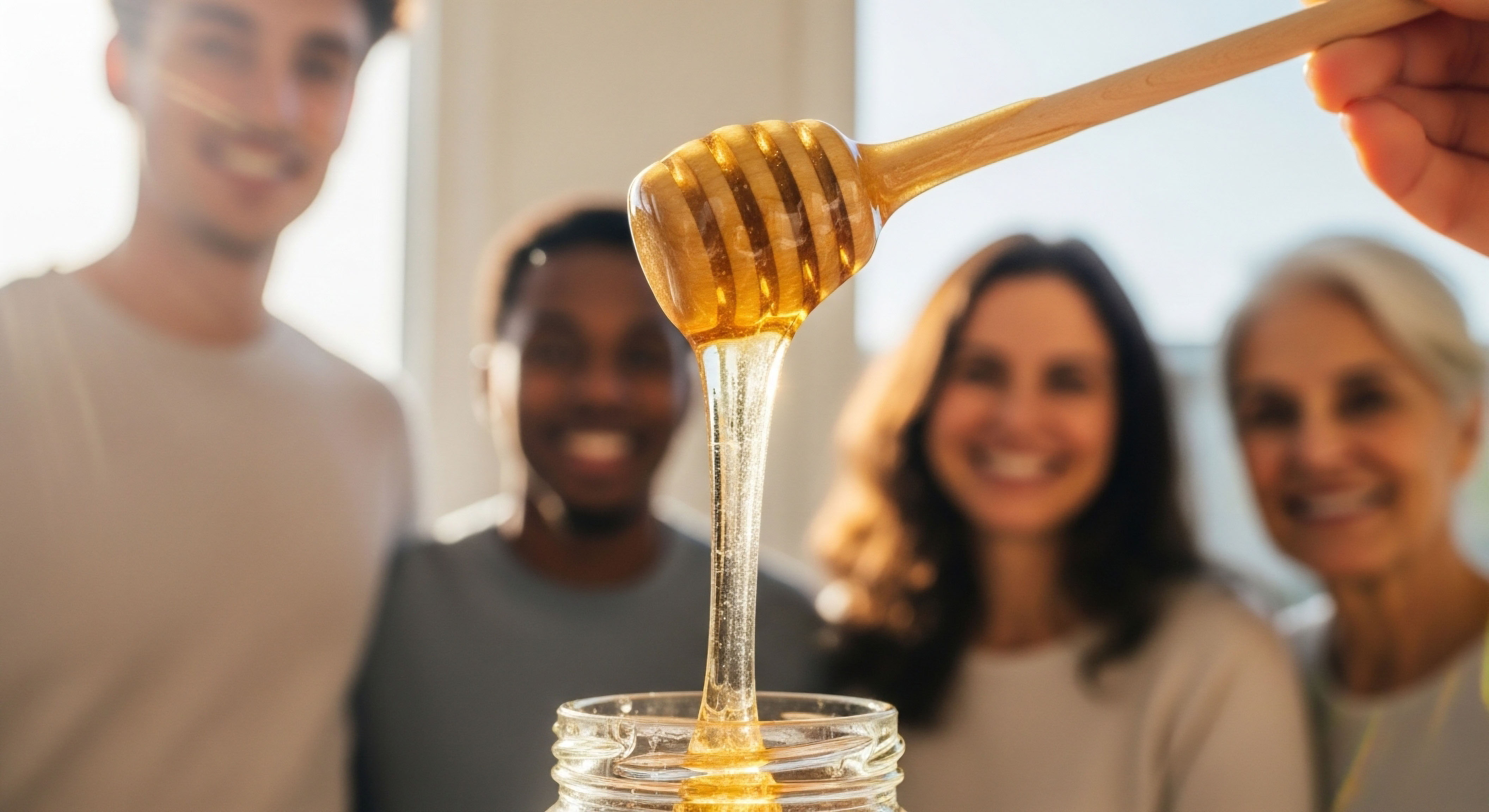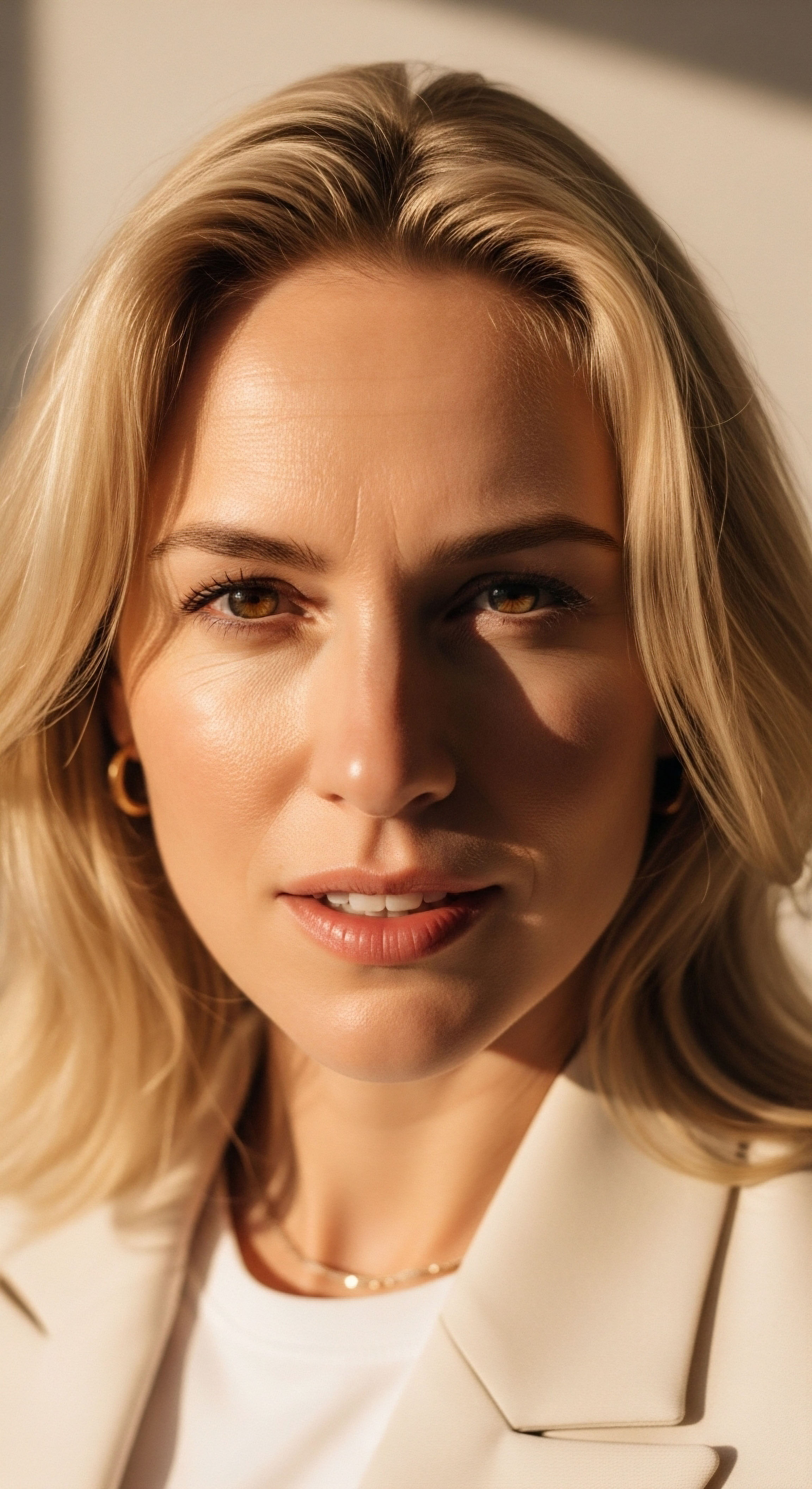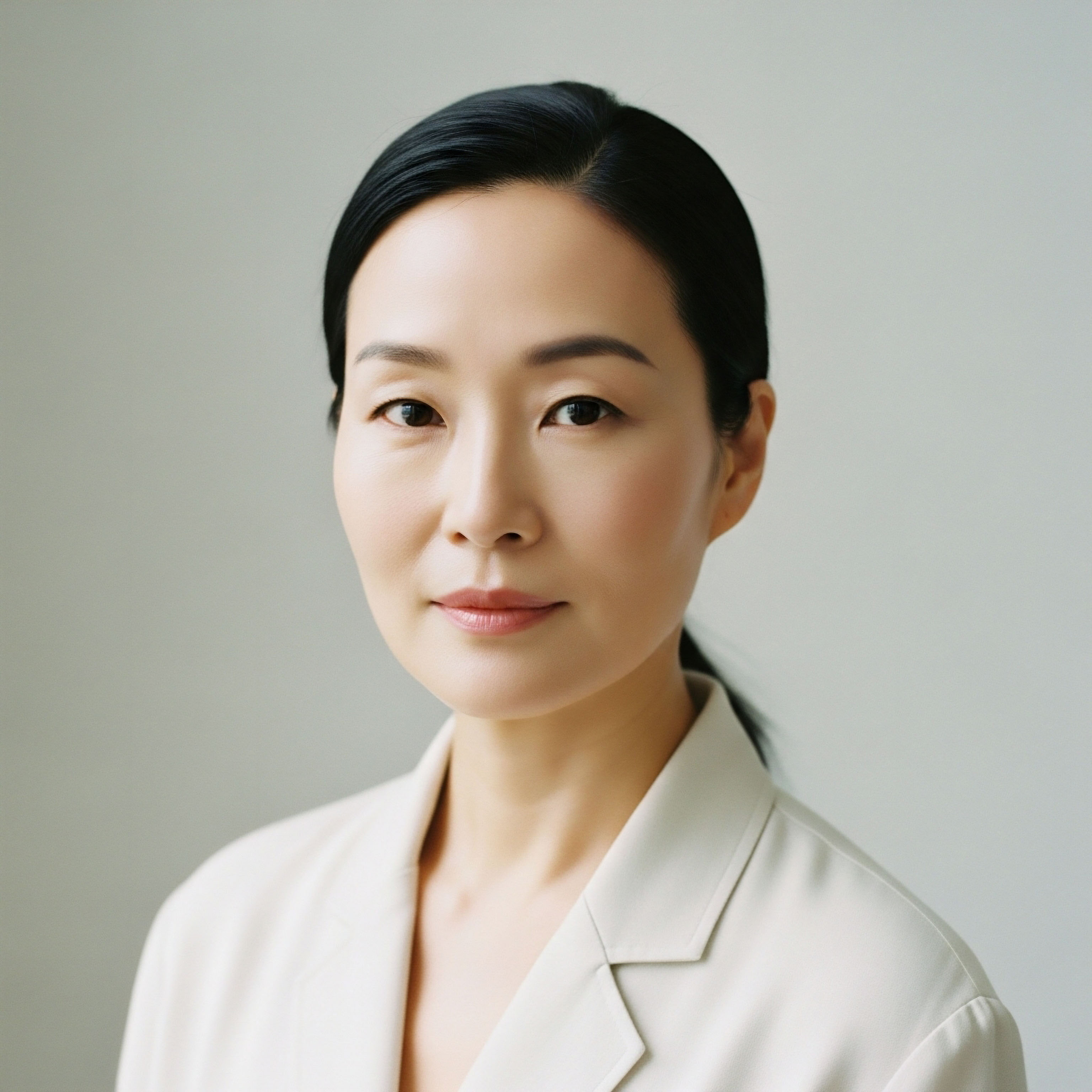

Fundamentals
The quest for a wellness app that genuinely understands and respects your unique biological identity can feel like searching for a signal in a sea of noise. Many digital health tools, despite their claims, are built upon a foundation of standardized data that often fails to represent the vast diversity of human experience.
This can lead to recommendations that feel generic, misaligned, or even discouraging, particularly when your body’s intricate hormonal symphony is not taken into account. The underlying issue is a design philosophy that prioritizes a one-size-fits-all model, overlooking the profound impact of your endocrine system on everything from your mood and energy levels to your metabolic function.
A truly inclusive and unbiased wellness app begins with a fundamental shift in perspective. It moves away from simplistic calorie-counting and exercise logging to embrace a more holistic view of your health. This means recognizing that your body is a complex, interconnected system, and that your wellness journey is deeply personal.
Such an app would be designed to listen to your body’s signals, helping you to understand the subtle language of your hormones and how they influence your daily life. It would provide you with the tools to track not just what you eat or how much you move, but also the nuances of your sleep patterns, stress levels, and menstrual cycle, if applicable.
This approach allows for a more personalized and empowering experience, transforming your wellness app from a mere data-entry tool into a trusted partner on your path to reclaiming vitality.
The architecture of an inclusive wellness app is built on the principle of personalization. It would leverage data to create a dynamic and adaptive experience, one that evolves with you as your body changes. This requires a sophisticated understanding of the endocrine system and its intricate feedback loops.
For instance, the app would recognize that a woman’s nutritional needs and energy levels can fluctuate significantly throughout her menstrual cycle, and it would adjust its recommendations accordingly. Similarly, it would understand that a man’s testosterone levels can be influenced by a variety of factors, from sleep quality to stress, and it would provide guidance on how to optimize these levels naturally.
By embracing this level of personalization, an inclusive wellness app can help you to cultivate a deeper understanding of your own biology, empowering you to make informed decisions that support your long-term health and well-being.


Intermediate
Venturing beyond the surface-level features of many wellness apps, we encounter the critical need for a design that is not only inclusive in its representation but also in its functional understanding of human physiology. A truly unbiased app does not simply offer a diverse range of avatars or culturally specific recipes; it integrates a sophisticated understanding of endocrinology into its core algorithms.
This means moving beyond the simplistic ‘calories in, calories out’ model and embracing the complex interplay of hormones that govern our metabolism, mood, and overall well-being. Such an app would be designed to recognize and respond to the nuanced hormonal fluctuations that occur throughout the lifespan, from the menstrual cycle and perimenopause in women to the age-related decline in testosterone in men.
One of the key features of an inclusive wellness app is its ability to track and analyze a wide range of biomarkers, both subjective and objective. This could include everything from self-reported data on mood, energy levels, and sleep quality to objective data from wearable devices, such as heart rate variability and body temperature.
By integrating these diverse data streams, the app can begin to build a comprehensive picture of an individual’s unique hormonal landscape. For example, a woman in perimenopause might use the app to track the frequency and intensity of her hot flashes, while a man concerned about low testosterone might use it to monitor his energy levels and libido. This data, when combined with information about diet, exercise, and stress, can provide valuable insights into the underlying drivers of these symptoms.
An inclusive wellness app should function as a personalized feedback system, helping you to understand the intricate connections between your lifestyle choices and your hormonal health.
The ultimate goal of such an app is to empower you to become an active participant in your own health journey. By providing you with the tools to understand your body’s unique signals, it can help you to make informed decisions that support your long-term well-being.
This might involve making targeted adjustments to your diet, exercise routine, or stress management practices, all with the goal of optimizing your hormonal health. For instance, the app might recommend specific foods or supplements to support progesterone production during the luteal phase of the menstrual cycle, or it might suggest certain types of exercise to help boost testosterone levels in men.
By offering this level of personalized guidance, an inclusive wellness app can help you to move beyond a one-size-fits-all approach to wellness and embrace a more individualized and effective strategy.

How Can Apps Address Hormonal Health Inclusively?
A key challenge in developing inclusive wellness apps is the need to account for the vast diversity of human hormonal experiences. This requires a departure from the traditional focus on a “standard” male or female body and a move towards a more nuanced understanding of the endocrine system.
For example, an app that is truly inclusive would not simply offer a “male” and “female” setting; it would allow for a more granular level of personalization, taking into account factors such as age, menopausal status, and the presence of any underlying health conditions. This could involve the use of sophisticated algorithms that can adapt to the unique hormonal fluctuations of each individual, providing personalized recommendations that are tailored to their specific needs.

The Role of Data in Personalized Hormonal Health
The development of truly inclusive wellness apps is heavily reliant on the collection and analysis of large and diverse datasets. This includes not only data from self-reported symptoms and wearable devices but also data from clinical studies and genetic testing.
By integrating these different data sources, it is possible to build more accurate and predictive models of hormonal health. For example, an app could use genetic data to identify individuals who are at a higher risk for certain hormonal imbalances, and then provide them with targeted recommendations to help mitigate this risk. Similarly, it could use data from clinical studies to validate the effectiveness of different interventions, ensuring that the recommendations it provides are based on solid scientific evidence.
The table below illustrates how a wellness app could be designed to address the specific needs of different user groups, moving beyond a one-size-fits-all approach to hormonal health.
| User Group | Key Hormonal Considerations | App Features |
|---|---|---|
| Women in Perimenopause | Fluctuating estrogen and progesterone levels, hot flashes, sleep disturbances | Symptom tracking, personalized nutritional guidance, stress management exercises |
| Men with Low Testosterone | Decreased energy, libido, and muscle mass | Lifestyle recommendations, exercise tracking, sleep optimization tools |
| Individuals with PCOS | Insulin resistance, irregular periods, hormonal acne | Carbohydrate-conscious meal planning, cycle tracking, skin health monitoring |
| Transgender Individuals | Hormone replacement therapy, monitoring of hormone levels | Medication reminders, symptom logging, connection to affirming healthcare providers |


Academic
The development of wellness applications that are both inclusive and unbiased necessitates a profound understanding of the intricate interplay between the endocrine system and the social determinants of health. From a clinical perspective, a truly effective application must transcend simplistic data collection and engage in a sophisticated analysis of an individual’s unique physiological and psychosocial context.
This requires a departure from the reductionist models that have traditionally dominated the digital health landscape and a move towards a more holistic, systems-based approach. Such an approach would recognize that an individual’s hormonal health is not solely a product of their genetics or lifestyle choices, but is also shaped by a complex web of social, economic, and environmental factors.
A key area of focus for academic research in this field is the development of algorithms that can account for the significant inter-individual variability in hormonal profiles. This involves moving beyond the use of static, population-based reference ranges and towards the development of dynamic, personalized models of hormonal health.
These models would be capable of integrating a wide range of data sources, including genomic data, metabolomic data, and data from wearable sensors, to create a high-resolution picture of an individual’s unique endocrine function. The goal of this research is to develop applications that can provide highly personalized and context-aware recommendations, tailored to the specific needs and circumstances of each user.
The future of inclusive wellness technology lies in the integration of multi-omic data with a deep understanding of the social and environmental factors that shape our health.
Another critical area of research is the development of culturally sensitive and linguistically appropriate interventions. This involves not only translating the content of the application into different languages, but also adapting the interventions to the specific cultural beliefs and practices of the target population.
For example, a dietary intervention that is designed for a Western population may not be appropriate for an individual from a different cultural background. By co-designing interventions with members of the target community, it is possible to develop applications that are more likely to be accepted and adopted by a diverse range of users.

What Are the Ethical Implications of AI in Wellness Apps?
The use of artificial intelligence in wellness applications raises a number of important ethical considerations. One of the primary concerns is the potential for algorithmic bias. If the data that is used to train the AI models is not representative of the diversity of the population, then the resulting algorithms may perpetuate and even amplify existing health disparities.
For example, an algorithm that is trained on data from a predominantly white, affluent population may not be accurate for individuals from other racial or socioeconomic groups. This could lead to misdiagnoses, inappropriate recommendations, and a widening of the health gap.

Ensuring Data Privacy and Security
Another key ethical consideration is the need to ensure the privacy and security of user data. Wellness applications collect a vast amount of sensitive personal information, including data on physical and mental health, lifestyle behaviors, and even genetic information. It is essential that this data is protected from unauthorized access and use.
This requires the implementation of robust security measures, as well as clear and transparent policies regarding data collection, use, and sharing. Users should have the right to know what data is being collected about them, how it is being used, and with whom it is being shared. They should also have the right to opt out of data collection and to have their data deleted upon request.
The table below outlines some of the key ethical challenges and potential solutions related to the use of AI in wellness applications.
| Ethical Challenge | Potential Solution |
|---|---|
| Algorithmic Bias | Use of diverse and representative training data, regular auditing of algorithms for bias |
| Data Privacy | Implementation of strong encryption and security protocols, transparent data policies |
| Informed Consent | Clear and concise explanation of data collection and use, easy-to-use privacy controls |
| Accountability | Establishment of clear lines of responsibility for algorithmic errors, independent oversight |
Ultimately, the development of inclusive and unbiased wellness applications requires a multi-faceted approach that combines cutting-edge technology with a deep commitment to ethical principles. By embracing a systems-based approach to health, and by prioritizing the needs of diverse and underserved populations, it is possible to create digital health tools that are not only effective, but also equitable and just.
- Knownwell ∞ This app focuses on weight-inclusive primary care, aiming to provide compassionate and comprehensive healthcare that is not centered on weight as the primary measure of health.
- Brave Health ∞ While not exclusively a wellness app, Brave Health provides accessible mental healthcare, accepting a wide range of insurance plans, including Medicaid and Medicare, to serve vulnerable populations.
- Culturally Adapted Apps ∞ Research has shown that wellness apps that are culturally adapted, for example, by including ethnic cuisines or representative imagery, have a greater appeal and are more effective in diverse minority communities.

References
- Firth, J. Torous, J. Nicholas, J. Carney, R. Pratap, A. Rosenbaum, S. & Sarris, J. (2017). The efficacy of smartphone-based mental health interventions for depressive symptoms ∞ a meta-analysis of randomized controlled trials. World Psychiatry, 16(3), 287-298.
- knownwell. (n.d.). Weight-inclusive healthcare for all. Retrieved August 6, 2025, from https://www.knownwell.co/
- Brewer, L. C. Kaihoi, R. Gathua, N. Rauk, P. Hagi-Sala, A. Wilson, R. & Lackore, K. (2019). A qualitative study of the perspectives of Somali and Latino immigrants on the DASH diet ∞ implications for dietary counseling. Journal of the Academy of Nutrition and Dietetics, 119(11), 1856-1867.
- Wilkes-Green, L. (2025, August 6). The future is female ∞ Why AI must centre women’s health. FemTech World.
- Brave Health. (n.d.). Mental health care for everyone. Retrieved August 6, 2025, from https://www.bebravehealth.com/

Reflection
The journey to optimal wellness is a deeply personal one, a continuous dialogue between you and your body. The information presented here is intended to serve as a map, a guide to help you navigate the complex terrain of your own biology.
It is a starting point, a foundation upon which you can build a deeper understanding of your unique needs and rhythms. The true power lies not in any single app or protocol, but in your own innate wisdom, your ability to listen to the subtle cues of your body and to respond with intention and care.
As you move forward, consider how you can cultivate a more intimate relationship with your own physiology, how you can become the foremost expert on your own well-being. The path to vibrant health is not a destination, but a continuous process of discovery, a journey of self-awareness and empowerment.

What Is Your Body Telling You Today?
Before you close this page, take a moment to check in with yourself. How are you feeling, really? What sensations are present in your body? What thoughts are running through your mind? There is a wealth of information available to you in every moment, a constant stream of data from your own internal guidance system.
The practice of tuning in, of listening with curiosity and without judgment, is the first and most important step on any wellness journey. It is a skill that can be cultivated over time, a practice that will serve you well in all aspects of your life. As you continue to explore the world of wellness, remember that the most valuable insights will always come from within.

Glossary

digital health

wellness app

metabolic function

endocrine system

menstrual cycle

energy levels

wellness apps

hormonal health




